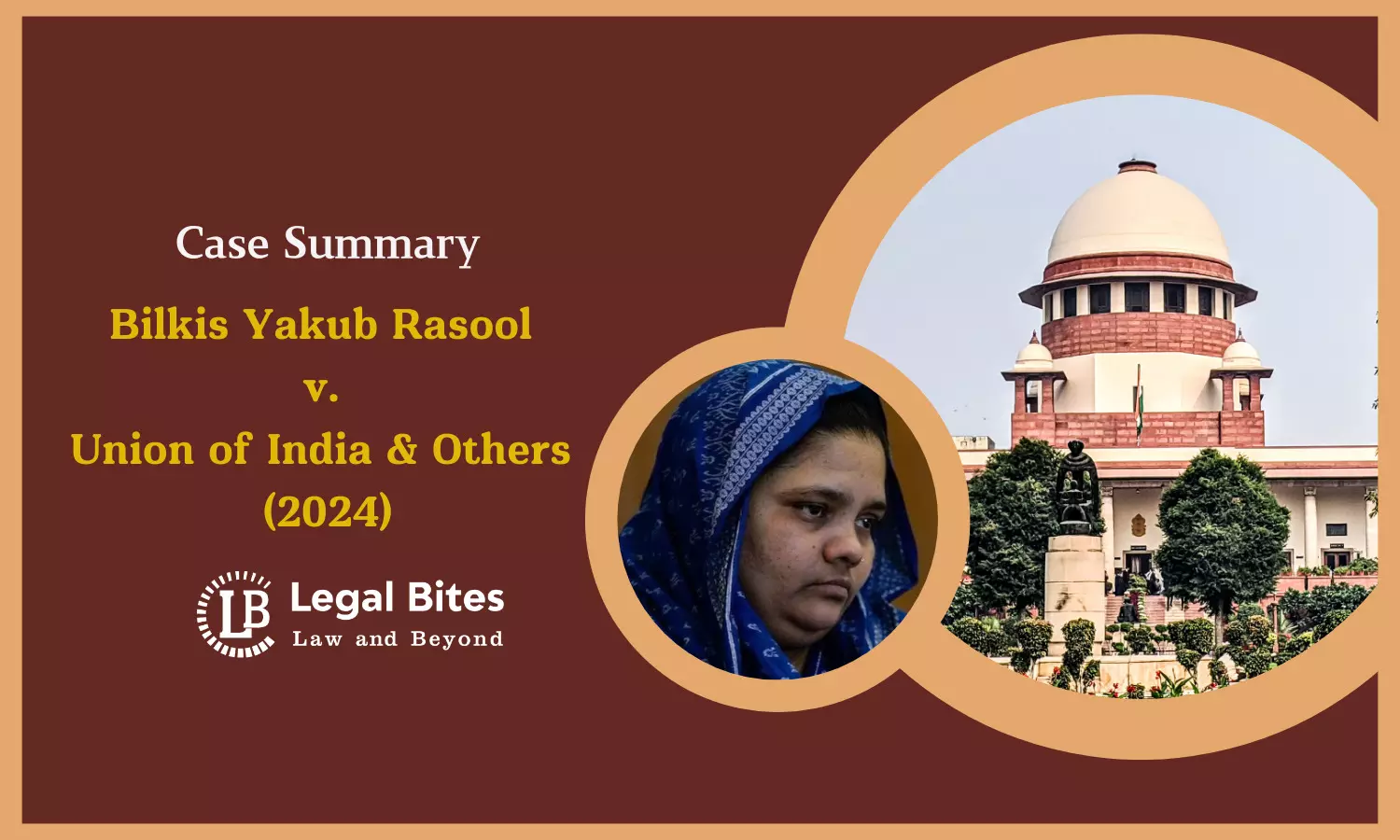Case Summary: Bilkis Yakub Rasool v. Union of India & Others (2024) | Supreme Court Overturns Remission of 11 Convicts
The Supreme Court criticized the Gujarat government's mishandling and overturned the High Court's decision permitting early release of Bilkis Bano's rapists.

This case arises from writ petitions challenging the premature release of 11 convicts involved in heinous crimes committed during the 2002 Gujarat riots. These crimes included gang rape and mass murder, notably involving the petitioner, Bilkis Yakub Rasool, a pregnant survivor, whose family members, including a two-day-old infant and a three-year-old child, were brutally murdered. The primary petition, Writ Petition (Crl.) No.491 of 2022, questions the legality of remission orders...
This case arises from writ petitions challenging the premature release of 11 convicts involved in heinous crimes committed during the 2002 Gujarat riots. These crimes included gang rape and mass murder, notably involving the petitioner, Bilkis Yakub Rasool, a pregnant survivor, whose family members, including a two-day-old infant and a three-year-old child, were brutally murdered.
The primary petition, Writ Petition (Crl.) No.491 of 2022, questions the legality of remission orders dated 10.08.2022 granted by the Gujarat government. Other connected writ petitions filed by public interest litigants and organizations also challenge the remission on legal and moral grounds.
Case Title: Bilkis Yakub Rasool v. Union of India & Others
Court: Supreme Court of India
Citation: Writ Petition (Crl.) No.491 of 2022 and connected writ petitions
Judge(s): Justice B.V. Nagarathna, Justice Ujjal Bhuyan
Date of Judgment: 8th January, 2024
Factual Background
On 27.02.2002, the Godhra train incident led to large-scale riots in Gujarat. On 28.02.2002, Bilkis Yakub Rasool and her family were targeted, resulting in mass murder and gang rape.
The Gujarat police initially filed a closure report, stating the accused were untraceable. However, following Bilkis’ petition, the Supreme Court transferred the case to the Central Bureau of Investigation (CBI), which filed a chargesheet in 2004.
Upon Bilkis’ plea, the trial was transferred to Mumbai to ensure fairness. In 2008, the Special CBI Court convicted 11 accused, sentencing them to life imprisonment for gang rape, murder, and rioting.
The Bombay High Court, in 2017, upheld the convictions and further convicted five police officials and two doctors for their complicity. The Supreme Court dismissed appeals filed by the convicts in 2017, upholding their life sentences. In 2019, the Supreme Court directed compensation of ₹50 lakh to Bilkis, acknowledging the unparalleled trauma she endured.
In 2019, respondent No.3 sought premature release under Sections 432 and 433A of the CrPC.Respondent No.3 specifically relied on the Gujarat High Court's order dated 17.07.2019, which granted the convict the liberty to approach the State of Maharashtra for seeking premature release.
Despite negative opinions from the CBI, Special CBI Court, and local authorities, Gujarat issued remission orders in 2022 following approval from the Ministry of Home Affairs.
Issues
- Whether Gujarat had the authority to grant remission despite the trial and conviction occurring in Maharashtra.
- Whether the orders complied with applicable legal standards and remission policies.
- Whether third-party petitions challenging the remission orders were maintainable.
- Whether the convicts’ liberty, obtained through remission, could override the principles of the rule of law.
Arguments of the Petitioner:
- Efficacy of Article 32 Writ Petition: The petitioner argued that filing a writ petition under Article 32 was the most effective remedy to address the procedural lapses in the remission process.
- Non-Consideration of Negative Opinions: The petitioner highlighted that the opinions of the CBI and the Special CBI Court in Mumbai, both opposing remission, were not considered. The contention of the Additional Solicitor-General (ASG) that the Godhra Court Judge’s favourable opinion sufficiently contradicted the plain language of Section 432(2) of the CrPC, which mandates consulting the judge who awarded or confirmed the sentence. Reliance was placed on judgments such as Sangeet, Ram Chander, and V. Sriharan.
- Inconsistent Position by Gujarat: A letter dated 17.11.2021 from the State of Gujarat stated that the appropriate government for remission was Maharashtra, yet no review petition was filed against the Supreme Court's 13.05.2022 order, showing procedural inconsistency.
- Rapid Approval Timeline: The petitioner pointed out the unusually quick process for granting remission, where opinions were sought and granted in a matter of days, reflecting non-application of mind.
- Questionable Document: A document dated 18.06.2022, allegedly containing the opinion of the Mumbai Special CBI Court Judge, was produced by the respondent. However, its authenticity was challenged as Gujarat denied possessing or knowing about it.
- Delayed Payment of Fine: Respondent Nos. 3 to 13 paid fines on 30.08.2023, admitting prior non-compliance. This should have extended their imprisonment by six years, but it was ignored in the remission decision.
- Material Omissions and Misleading Statements: Respondent No. 3’s writ petition omitted critical details, including the nature of the crimes (gang rape and mass murder) and the victims' identities. Misleading representations regarding High Court judgments were made, suggesting contradictions between the Bombay and Gujarat High Courts, which were not factual.
- Mechanical Exercise of Power: The petitioner argued that the remission process lacked due diligence and was conducted mechanically without proper consideration of key facts.
Arguments of the Respondents:
- Jurisdiction of the Appropriate Government: The respondents argued that the State of Gujarat was the appropriate government under Section 433 of the CrPC for considering remission, as the crime occurred there. They relied on the Supreme Court’s 13.05.2022 order, which directed Gujarat to process remission applications.
- Compliance with Procedure: The respondents claimed that the Jail Advisory Committee of Gujarat had recommended remission after due deliberation, and the Central Government had affirmed it following proper procedure.
- Opinion of the Godhra Court Judge: The respondents contended that the Godhra Court Judge’s favourable opinion on remission was relevant and sufficient under Section 432(2) of the CrPC. The use of the word “may” in Section 432(2) suggested that consulting the sentencing judge was not mandatory.
- Approval by Central Authorities: The State argued that the remission decision had been endorsed by the Central Government, which consulted the CBI and received its recommendation on 09.07.2022, supporting the decision.
- No Procedural Irregularities: The respondents denied any procedural lapses or lack of diligence, asserting that the decision was made within the legal framework and in consultation with relevant stakeholders.
- No Misrepresentation: Respondent No. 3 refuted allegations of misrepresentation in the writ petition and maintained that all material facts, including judgments upholding the conviction, had been placed before the Court.
- Humanitarian Considerations: The respondents argued that remission was granted based on recommendations reflecting rehabilitation and reform, aligning with constitutional principles and Gujarat’s remission policy.
Judgment
Maintainability of the Petitions:
The court held that Bilkis, as a direct victim, was entitled to file a writ petition under Article 32. PILs challenging the remission were deemed maintainable for future adjudication.
Jurisdiction and Legal Errors:
The court ruled that Gujarat was not the appropriate government under Section 432(7) of the CrPC. Since the trial and conviction occurred in Maharashtra, remission applications should have been considered by Maharashtra.
Non-Compliance with Law:
The remission orders violated legal procedures. Relevant authorities, including the CBI and the Special CBI Court, had opposed the premature release.
The Gujarat government ignored objections from key stakeholders, including the Sessions Judge and CBI, while granting remission under a 1992 policy, which was inapplicable to this case.
Fraudulent Misrepresentation:
The court noted that the 13.05.2022 order enabling Gujarat to grant remission was obtained through suppression of material facts and misrepresentation.
Doctrine of Rule of Law:
The court underscored the primacy of the rule of law over personal liberty. It held that liberty obtained through illegal means could not be upheld, as it would undermine public faith in justice.
Conclusion
The remission orders dated 10.08.2022 were quashed as illegal and non-est. The convicts were directed to surrender within two weeks. The court emphasized that remission must follow due process, considering victims’ rights and societal impact. The court reiterated the judiciary’s role as the guardian of the rule of law, ensuring that justice serves not just convicts but victims and society at large.
This judgment highlights the delicate balance between personal liberty and the rule of law, reaffirming the judiciary’s role in upholding justice and safeguarding democratic values. The ruling serves as a precedent for the equitable and lawful exercise of remission powers.
Click Here to Read the Official Judgment

Karan Patel
Karan Patel is an alumnus of the prestigious Faculty of Law, Delhi University, with a specialization in Civil Law and Procedural Law. As a dedicated legal scholar, his work focuses on exploring the nuances of civil justice systems and procedural frameworks through in-depth research and writing.
